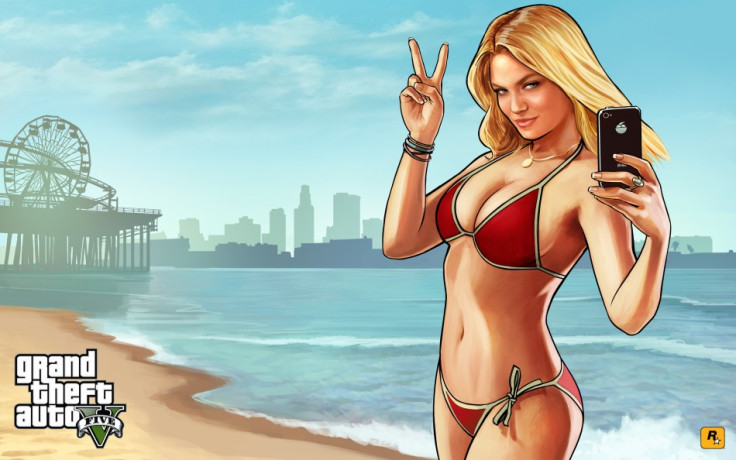Banning GTA 5 in the UK is a lazy attempt to blame video games for societal ills

Video game developer Rockstar North has once again managed to offend a large chunk of the general public with the release of its controversial franchise Grand Theft Auto (GTA) V.
The game is famous for its violence and, more recently, the depiction of women as strippers and prostitutes. Its latest edition has already been removed from sale by two Australian retail chains, Target and Kmart.
Thousands of campaigners have rejoiced at the move and now some are suggesting the game will be banned in the UK, Rockstar's home market.
So, should we? After all, the game allows you to run over women in a car, spray a strip club with machine gun bullets, and even simulate sexual acts with prostitutes.
As a female gamer, I might be expected to be mortified by this so-called orgy of misogynistic brutality. But in fact I am firmly against banning the game.
Cherry Picking
It's easy to blame games such as GTA V for creating sexism in the industry, and violence in real life. Campaigners such as Anita Sarkeesian, who was bombarded with threats after launching a documentary project about the depiction of women in games, are quick to claim that franchises such as GTA objectify women and perpetuate abusive attitudes in society.
However, this argument overlooks violent games in which women are dominant characters and just as ruthless as men.

For example: myriad female characters in fighting games such as Mortal Kombat, Street Fighter, and Soul Calibur easily brutalise their male opponents; the Silent Hill horror franchise is dominated by strong female characters throughout; the eponymous lead in Bayonetta is a whirlwind of violence; Ellie from Last Of Us demonstrates depth, fortitude, and a violent streak; the female Commander Shepard from acclaimed RPG Mass Effect saves the entire galaxy; and of course, Lara Croft from Tomb Raider is one of gaming's most iconic and belligerent heroines.
It is ignorant to believe that video gaming characters are solely the realm of the strong generic male.
Stop blaming games for societal ills
Furthermore, blaming and banning computer games for the problems of society, especially for women in tech, is a lazy assumption to make and almost as knee-jerk and frustrating to hear as blaming games for high school shootings.
Violence in games does not lead to violence in real life.
Out of the 25 studies conducted into whether violent video games result in actual violence, let alone mass shootings, there has been no conclusive evidence that in-game brutality translates into real-life abuse.
The only thing that studies have shown is the correlation between active gaming and obesity (and as someone who has done a 26-hour stint playing World of Warcraft and surviving on pizza, Doritos and Red Bull, I can say that doesn't sound unfeasible).

If we want to look at why there is disproportionately high number of women suffering from domestic violence or objectification, why don't we take at look at our obsession with celebrity culture in which real-life women gain fame and fortune from sex tapes and get naked for the sake of column inches, with little talent other than mastering the art of tit-tape on the red carpet.
Why not ban books, magazines, music, film, and all other mediums (fantasy or not) for showing fake violence? There's no scientific evidence that this translates into real life violence, but hey - why not?
Let's just censor all creative mediums that depict war, fighting, drug abuse, or any violent act, and just make sure we have endless movies starring Reese Witherspoon and Sarah Jessica Parker about shoes, handbags, and women only being happy once they have found the right guy.
That's safe; that's facile.
Why there's a dearth of women in tech
While the protesters in Australia said GTA V perpetuated violence against women, others have called for the ban of the franchise for years, citing Rockstar's flagship product as a reason for the lack of women in tech and therefore sexism by default.
However, it's another case of people mixing up causes and immediately shrieking 'sexism' - applying age-old opinions to an industry that don't necessarily have the right people to fill the role.
It all starts at school.
Women are capable of doing the job in tech just as well as men, but the lack of women following careers in science, tech, engineering, and maths is perpetuated by the dearth of graduates in that field.
You can't weasel your way into getting a coding or games development job - you either have the skills to do it, or not. You can't blame games like GTA V for perpetuating a discrepancy of female representation in the industry when there aren't enough qualified people to take up the mantle.
In the US, only 0.4% of female college freshmen say they intend to major in computer science. In the UK, the Campaign for Science and Engineering (Case) revealed that in 2013, only 245 girls took computing at A-level, compared to 3,513 boys.
Furthermore, in wider traditional science subjects, the Institute of Physics and Case revealed that, for more than 25 years, only around 20% of girls-take A level physics.
So before you jump on the bandwagon of asking to censor or ban a video game, ask yourself: is it really that sensible to chide a digital entertainment medium for the treatment of women around the world, the lack of women in jobs, and the treatment of those who are in them?
Or are there broader societal issues at the root of these problems that no amount of banning adult-themed video games will solve?
© Copyright IBTimes 2025. All rights reserved.























